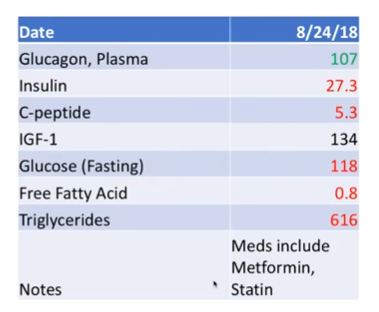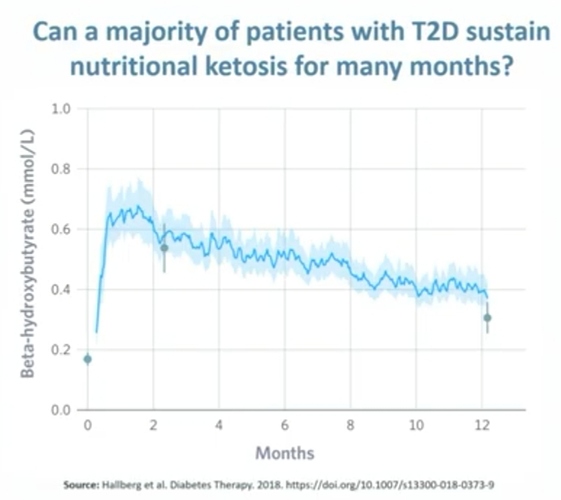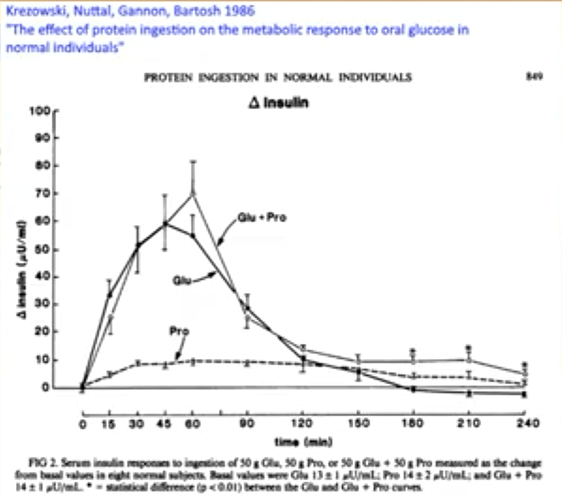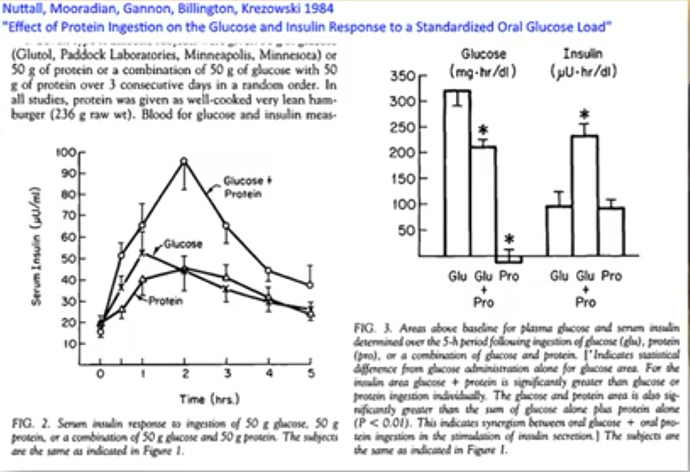How do you view ketone levels: good, bad, or indifferent?
- Don’t care as long as I’m losing fat.
- Higher than minimal ketone levels make me feel better.
- Minimal ketosis is optimal, extra ketones are a bad sign.
- I stress out over getting a good level and don’t know what it should be.
0 voters
And now a few things I’ve been meaning to post about in some type of logical stream of thought… Protein, glucose, ketones and insulin: context matters.
First, a couple of graphs from Ketofest. The first one is from a presentation by Dr. Phinney, who is the source of the phrase “nutritional ketosis” set at a threshold of 0.5 mmol. He is also involved in Virta Health, which treats diabetics using a ketogenic diet. So, what level are these patients maintaining to get the benfits of the program?
HALLBERG - VIRTA DATA
Not very high, right? Incredible health and weight loss benefits associated with minimal ketone levels. No need to chase ketones unless you find additional subjective benefits at higher levels. The amount of protein they are eating is based on these recommendations: https://blog.virtahealth.com/how-much-protein-on-keto/
This is where context becomes important. From Richard’s Ketofest '19 presentation we have a comparison of insulin release in response to protein and/or glucose in T2D subjects vs. healthy ones.
HEALTHY:
T2 DIABETICS
Note: we typically hear that protein requires approximately 1/2 of the insulin of glucose. This is a rule of thumb from studying T1D where they look at how much insulin is needed to “cover” the increase in glucose due to protein. (A minute here for us to ponder why they are producing glucose in reponse to food without insulin to start the ball rolling.  ) What it does not tell us is how much insulin an individual with functional beta cells in their pancreas produces in response to protein.
) What it does not tell us is how much insulin an individual with functional beta cells in their pancreas produces in response to protein.
Now, you might be thinking “Hey, that’s not in the context of ketosis!” and you’d be correct. So let’s assume an Ideal Bikman Ratio of 1:3, where insulin and glucagon remain at a constant ratio in ketogenic subjects. If you’re not familiar with this context, see Dr. Bikman https://youtu.be/z3fO5aTD6JU and Amber O’Hearn http://www.ketotic.org/2012/08/if-you-eat-excess-protein-does-it-turn.html.
So healthy ketogenic subjects have no issues maintaining constant, or near-constant, blood glucose levels by eating protein without carbs. That doesn’t mean glucose isn’t produced, just that there is a balance between insulin and glucagon to keep blood glucose steady. They don’t simply neutralize each other. (There is a hormone that neutralizes both insulin and glucagon, called somatostatin, but I’m not going that deep down the rabbit hole.) Physiologically, insulin levels are the dominant force on whether or not free fatty acids (FFA) are released from healthy adipose tissue. If you have insulin resistance, some percentage of your fat cells are leaking FFA and do not respond to insulin, thus diminishing its effect there. T1D have no control over FFA levels without injecting insulin, and produce excess glucose and ketones because of it, even when fasting.
Glucagon, on the other hand, is the primary signal to your liver to produce more glucose by whatever means are available to it, thus keeping blood glucose from going too low in the presence of increased insulin. It doesn’t have the ability to overcome the effect of insulin on adipocytes at physiological levels. T2D are likely to have an impaired level of glucagon. Much like insulin, this can be hyperglucagonemia (too much glucose production) or glucagon resistance (too little glucose production).
Let’s look at what one person’s disturbed I:G ratio looks like from Dave Feldman’s n=many research: https://youtu.be/Z8TtApNYQfE?list=WL&t=465
CHART3

I’ll do the math for you… that’s a ratio bordering on 1:4 along with a high amount of basal glucagon and insulin. This is a fasted test. What happens when that person eats protein? I’d love to see some data, as far as I know there isn’t any in that context.





 if I eat something with sneaky carbs, like at a restaurant. And different proteins make me feel different, though I think some of that is a result of amino acids that alter neurotransmitters directly. I’m especially sensitive to typtophan and taurine and wanting to sleep afterwards.
if I eat something with sneaky carbs, like at a restaurant. And different proteins make me feel different, though I think some of that is a result of amino acids that alter neurotransmitters directly. I’m especially sensitive to typtophan and taurine and wanting to sleep afterwards.